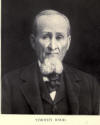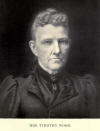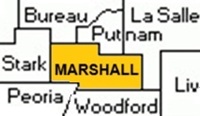
 Timothy
WOOD, who died on his farm on section 32, Senachwine township,
December 20, 1905, was one of the old and honored pioneer
residents of Putnam county and prospered in his undertakings as
the years went by. He was largely engaged in trapping, hunting
and fishing in an early day and found therein a profitable
source of income which enabled him to make judicious investments
in property, so that he left an estate of about eleven
forty-acre tracts of land, much of it lying in the districts
surrounding Lake Senachwine.
Timothy
WOOD, who died on his farm on section 32, Senachwine township,
December 20, 1905, was one of the old and honored pioneer
residents of Putnam county and prospered in his undertakings as
the years went by. He was largely engaged in trapping, hunting
and fishing in an early day and found therein a profitable
source of income which enabled him to make judicious investments
in property, so that he left an estate of about eleven
forty-acre tracts of land, much of it lying in the districts
surrounding Lake Senachwine.
His life history began September 22, 1817, in the town of Ellisburg, Jefferson county, New York, he being the second son of James and Barbara WOOD, whose family numbered thirteen children, six of whom are yet living. His father having given him his time, he started out in life on his own account at an early age and entered the employ of John FISH, his duty being to hoe, to ride the horse used in plowing the corn and to do chores and other work on the farm, receiving in compensation for his services a wage of six dollars per month. In the fall he took his wages in sheep at one dollar per head for the old ones and seventy-five cents for the lambs. In early manhood he also spent considerable time in hunting, as had his father before him, for New York was then a comparatively new state and there was considerable game there. He had often gone on trips with his father to his traps and to shoot ducks, and after leaving the employ of Mr. FISH, Timothy WOOD began trapping in the fall and winter for himself.
The following spring, on the General Houston, he secured a position as cook at a salary of fourteen dollars per month and late in the summer he bought a little vessel or sloop called the Dolphin and carried on the business of buying and selling fruit. Subsequently he sailed for six or seven years on different vessels and about the expiration of that period, in connection with his brother, Epenateus WOOD, he bought the schooner, H. Emery, of Sandy Creek, New York. They did a general traffic with that boat, but sold it in the succeeding fall and Timothy WOOD then went on the Troy and Erie canal for one season as bowsman at fifteen dollars per month. Later he spent considerable time at Ellisburg, his old home.
While there Mr. WOOD was married to Fannie GARRETT, January 19, 1839, and for four years they resided on a farm which they purchased in Jefferson county. There the wife died July 17, 1843, and their two children, a son and daughter, both died in early youth.
Mr. WOOD then sold his farm to his father and on the 10th of September, 1843, started from Oswego, New York, on a propeller around the Great Lakes, arriving at Chicago about September 25, 1843, covering the entire distance over fourteen hundred miles by water. The present metropolis was then a small hamlet with a few log houses and an old fort, and there was a corduroy bridge over the Chicago river. The succeeding morning he arranged to ride with a teamster to Belvidere on the Kiswaukee river and on reaching his destination he began trapping, in which he did well. Later he and his cousin, John BRUCE, went to Pictakee lake by wagon and spent the night in an incompleted log cabin. About two inches of snow fell that night and in the morning Mr. WOOD told his companion that if he would get breakfast he (WOOD) would look around to see if he could find some deer tracks. He soon discovered a couple and, following them up, at length shot and killed the deer. The shot startled another lying near by and Mr. WOOD also killed that. After about a month his companion, Mr. BRUCE, returned to Belvidere but Mr. WOOD remained, trapping and hunting in that district, taking his furs to Chicago to sell. He made four or five trips with furs and deer skins and after having met a fair measure of success in this he started on a return trip to his old home in New York, April 15, 1844, again making the journey by water. In the succeeding fall he and an old friend and partner, Nelson GILBERT, fitted out for another trip to the west, starting on the 1st of September, 1844. It was a rough passage but at length they landed at Little Fort about the last of September, after which they hired a team to take them and their boats and outfit to Fox river in Lake county, Illinois. They encamped between Pistakee lake and Big Rice lake and hunted and trapped throughout this lake region, and they spent the winter on the claim of the POWELL brothers, and in January Mr. WOOD and his partner took their furs to Chicago. They again returned by water to New York, where Mr. WOOD spent the summer and once more in the fall started for Illinois, reaching Chicago September 10, 1845.
As time passed and the country became settled the greater part of the land was being taken up for homesteads and the timber was being cleared off. He continued the work of trapping and hunting, building a cabin on the banks of Fox river, and again he succeeded in getting a large number of furs, although at different times his traps were stolen by Indians, who were numerous around the lakes. He also carried his effects into the southern part of Wisconsin, which at that time was not very largely inhabited by the white people. He trapped and bought fur from the Indians, remaining in that locality until the spring, when he again sold his furs in Chicago and once more started for New York.
 After
remaining a part of the summer in his old home Mr. WOOD met and
married Lois A. BLANCHARD, the eldest daughter of Salma and
Belinda BLANCHARD, of Vermont, who had removed to New York at an
early day. Mr. WOOD had been acquainted with his wife from her
early girlhood. Eight children were born of this marriage: Mrs.
Emily HORNER, who is now a widow and resides in Henry, Illinois;
James T., who died when four years old; Alice, who became the
wife of Emory SMITH, who resided near Henry, while her death
occurred in 1905; Frank, who is proprietor of a club house on
the lake and owns a third interest in the WOOD estate; Bert, who
died at the age of three years: Timothy, who is living in
Oklahoma, where he owns a large farm; Clara, who died at the age
of twenty months; and Charles, who is now living on the old
family homestead, and owns a one-third interest in the WOOD
estate.
After
remaining a part of the summer in his old home Mr. WOOD met and
married Lois A. BLANCHARD, the eldest daughter of Salma and
Belinda BLANCHARD, of Vermont, who had removed to New York at an
early day. Mr. WOOD had been acquainted with his wife from her
early girlhood. Eight children were born of this marriage: Mrs.
Emily HORNER, who is now a widow and resides in Henry, Illinois;
James T., who died when four years old; Alice, who became the
wife of Emory SMITH, who resided near Henry, while her death
occurred in 1905; Frank, who is proprietor of a club house on
the lake and owns a third interest in the WOOD estate; Bert, who
died at the age of three years: Timothy, who is living in
Oklahoma, where he owns a large farm; Clara, who died at the age
of twenty months; and Charles, who is now living on the old
family homestead, and owns a one-third interest in the WOOD
estate.
After his second marriage Mr. WOOD started with his bride for the west on the 2d of September, 1848, on the propeller New York. On the way the vessel stopped at Freeport, Ohio, where Mr. WOOD purchased twelve barrels of apples at seventy-five cents per barrel, which he sold in Milwaukee for three dollars per barrel. They landed at Little Fort, September 25, 1848, and they made their way to the home of Ting POTTERS, a friend of Mrs. WOOD. Having his wife here, Mr. WOOD made a permanent settlement in Illinois, locating in the lake region. There were many geese and wild ducks around the lake. In fact they made so much noise that Mr. WOOD and his wife could hardly sleep. After living in the lake country for two years, during which time lie was engaged in hunting and trapping, they removed to a place on the Fox river and again engaged in trapping and buying furs. The quantity of game to be had at that time is indicated by the fact that during the winter and spring he caught two thousand nine hundred and ninety-six muskrats and three hundred minks and coons, also buying a good many, and once more he sold his furs in the spring. For some time he continued the work of hunting and trapping in the winter time and in the spring and summer hunted ducks, geese, prairie chickens and quails, which were sent to the Chicago market. As the supply of game became somewhat exhausted in one locality he would remove to another and for about four years he lived in Aurora. On the expiration of that period he bought a house and seventy acres of land at Piano, Illinois, where he resided for two years and during that period Mr. WOOD came south into Putnam county, where he arrived in October, 1852. There was still plenty of game in this locality. Hardly had be arrived before Mr. WOOD sighted a deer which he killed. He and his companion hunted and trapped, selling their game to the steamboats which were then coming down the river. In the winter he returned to Piano, where again he shot game which he shipped by stage to Chicago. In the fall of 1853, however, he again came south to Putnam county with his brother-in-law, Thomas BLANCHARD, and a Mr. BEECHER, and the winter was spent in trapping and hunting, again selling their game to the steamboats. The next day after their arrival Mr. WOOD and his brother-in-law concluded to visit the lakes on the west side of the river and rowed down the stream to Senachwine creek and up the creek, coming to Swan lake and to Mud lake. In this part of the county they found ample opportunity to carry on business and thus the summer and winter passed. In the succeeding spring, selling his farm at Piano, Mr. WOOD moved his family to Putnam county. The railroad had just been completed to Peoria and they traveled by train to Henry, which at that time contained only a few houses, a hotel and several stores. He was now at home among the deer and wild turkeys and furs were also to be had in abundance, so that he did well in hunting and trapping until the river and lakes froze over. He was then induced by Mr. SPARLING, also a pioneer resident, to join him in fishing business, and he and his family, in the fall of 1857, took possession of a little cabin on the bluff overlooking what is now the pleasure resort called Walnut Grove. Mr. WOOD took charge of the fishing business for Mr. SPARLING and at the same time improved the advantageous opportunities for buying up land around the lakes. After living on Mr. SPARLING's place for four years he bought a farm about mile south, on which he built a house and barn, the family taking up their abode there in the fall of 1861, although he continued with Mr. SPARLING in the fishing business for about thirty years. From time to time he purchased more land in the vicinity of Senachwine and adjacent lakes, owning in addition to his homestead about six hundred and forty acres. About this time the dam was put in at Henry by the government, which raised the water and flooded six hundred and forty acres of land belonging to Mr. WOOD and also other land around the lakes. A law suit was instituted with the result that the government sent two members of the house and three from the senate to investigate the amount of damage done and appraised Mr. WOOD's damage at six thousand six hundred and seventy dollars, but the lawyer who had the matter in charge died about that time and the one who then took up the claim compromised for eight hundred and eighty dollars. Mr. WOOD, however, continued owner of all of his land and carried on his hunting and trapping. In time this region, rich with game, began to attract sportsmen to it and in July, 1885, two gentlemen of Chicago negotiated with Mr. WOOD for a site to build a club house and boat house for a shooting club known as the Swan Lake Club. Mr. WOOD leased them one hundred and twenty-five feet back from the face of the bluff and between two roads, also a place for boat and ice houses. From this there has been derived a good income continuously since. Mr. WOOD was paid two shares in the club and was to have all the hay, pasture, fur-bearing animals and fishing over all the lands owned, leased or controlled by the club for the term of ninety-nine years. In addition to this property Mr. WOOD continued owner of four hundred and forty-five acres of land which he leased for fishing purposes, receiving therefrom three hundred dollars per year. He still continued to buy fur and had men trapping for him, and in the winter of 1896 he handled about ten thousand furs. No man has been more closely connected with the business of trapping and hunting in Illinois than Mr. WOOD, who continued therein throughout his life. He started out for himself when but a mere boy, taking up his first small wages in sheep and letting them out to double in four years, showing business qualities which have constantly been developed, bringing him a measure of success until he became owner or was interested in nearly six thousand acres of fishing and hunting property. At the time of his demise he owned eleven tracts of land of five thousand acres surrounding Lake Senachwine and this brought to him and still yields to his family a splendid income. No man was more closely associated with Illinois in pioneer times than Timothy WOOD, who has hunted and trapped all over the central and northern sections of the state in its lake regions when scarcely a cabin had been built in the district and when the Indians were still numerous. As the larger game was no longer found in the district he concentrated his attention upon hunting and trapping those animals which are valuable on account of the fur and later he found great profit in leasing his land for hunting and fishing purposes to those who delight in those sports.
Charles A. WOOD, now residing upon the old homestead, was here born November 5, 1857. He pursued his education in the district schools and also in the German school at Henry and throughout his entire life has resided upon the home farm. On the 22d of December, 1894, Mr. WOOD was married to Miss Mary M. ANDERSON, of Whitefield township, Marshall county, and they have five children.
Charles A. WOOD is a most energetic, enterprising farmer and he was appointed administrator of his father's estate. His father's land was leased to the Swan Lake Club for a period of years and beside the yearly rental the family have the use of about four thousand acres of land belonging to the club. They use it for pasture and hay land and Charles A. WOOD, in partnership with George E. SPARLING, owns a ferry on the lake, connecting the island and land on the east side with the main land. From this he derives a goodly income. Like his father, he is a democrat in his political views and affiliation and has served as school director but has never aspired to other offices.
Extracted July 2011 by Norma Hass from Past and Present of Marshall and Putnam Counties Illinois, 1907.
| Bureau Putnam La Salle | |||
| Stark |
 |
||
| Peoria | Woodford | ||

